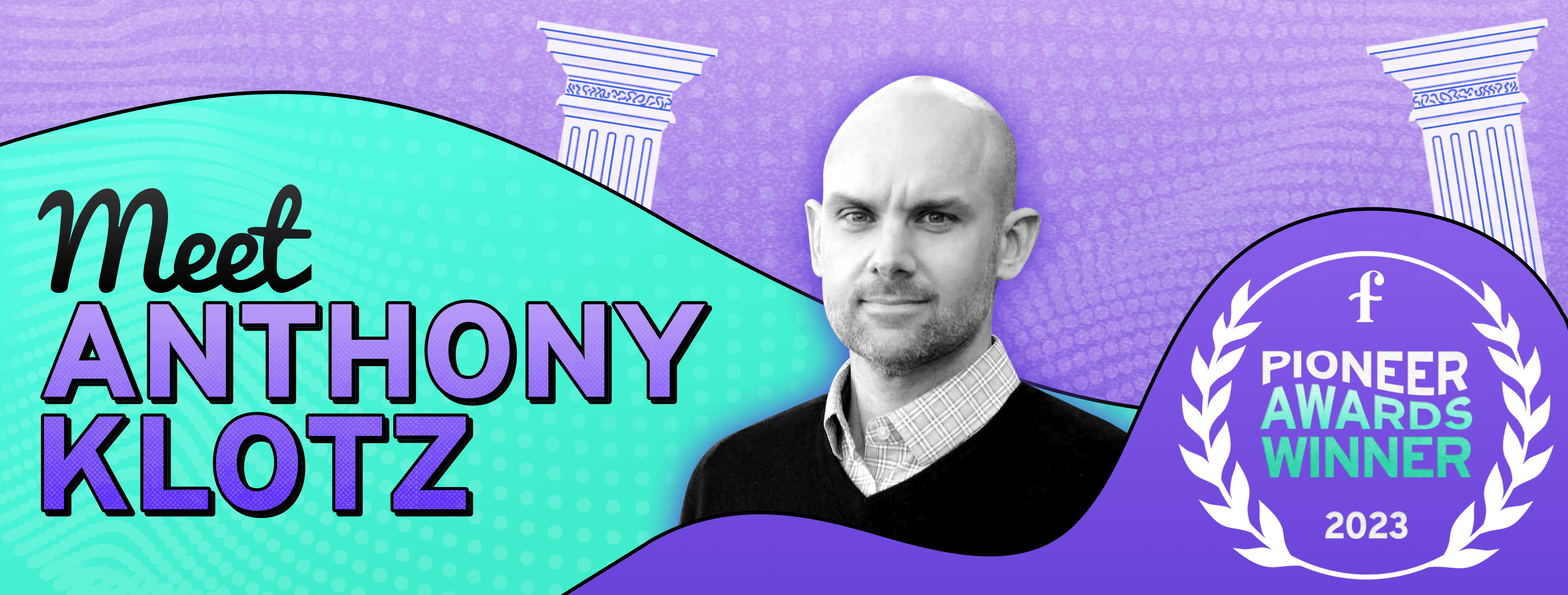Pioneer Profile: Meet Anthony Klotz
4th Oct 2023

It’s time that we recognise the people behind the evolving world of work. Our working lives have shifted to being more inclusive, more people-centric, more flexible, and just plain better for both employees and companies.
These changes didn’t just happen: they were put into place and upheld by individuals and teams working to create a better working future for everyone.
So we’re finally putting the spotlight on the people who make great companies great: the people-people.
People-people are crucial to the success of every company. They find you the talent that drives you forwards, and they’ve taken on an increasingly strategic role in the past few years – often taking on responsibility for mental health, diversity and inclusion, culture, EVPs, Employer Branding and team happiness.
Read more about the Pioneers List and go behind the scenes to understand how and why we’ve selected our Pioneers.
We were lucky enough to speak with Anthony Klotz, Associate Professor of Organisational Behaviour at the UCL School of Management (and coiner of the term ‘the Great Resignation’!), about his career, his knowledge of flexible working and building great company cultures, and his hopes for the future of work.
Tell us a little bit about your career history, and how you got to where you are now. What were the key milestones?
After growing up in a family business in the transportation industry, I spent the first five years of my career working in operations management in manufacturing plants for General Mills, leading teams that were making everything from Cheerios to Betty Crocker Brownies to Pillsbury crescent rolls.
I then left big business and joined an entrepreneurial venture with my good friend. During this time, I also started working on my MBA part-time, taking classes in the evening. When I took the required leadership class, I had a bit of an epiphany, and realised that becoming a professor would allow me to focus full-time on my favourite part of the jobs I’d had – learning and teaching management. Of course, at the time I thought that being a professor was mainly about teaching, but as I would come to learn and eventually enjoy, it mainly involves research.
When did you become interested in flexible working, EVPs and the future of work?
Growing up in a family business and then working in an entrepreneurial venture, I have always been drawn to the freedom and flexibility that work can provide. My doctoral dissertation was focused on how employees navigate the resignation process – from the time they decide to quit until they actually leave the organisation for the final time. These two things – flexibility and resignations – may not seem to have much in common. But from my perspective, they both involve employees exercising their freedom, and the personal and career benefits that freedom can provide when it’s managed well by employees and companies.
What's the most impactful change you’ve overseen?
The organisational policy and benefit changes that excite me the most right now are those that provide employees who want to quit their jobs with flex-based alternatives to doing so. Some companies are getting much more innovative when it comes to providing would-be leavers with the option to switch to part-time, to job share, to take a sabbatical or another form of leave, or to boomerang back at some point in the future. This enhanced career flexibility can have long-term benefits for workers and firms alike.
What’s the biggest impact flexible working has had on your own life?
Well, I’d be lying if I said that the appeal of flexible working that comes with being a professor wasn’t one of the main reasons I chose to pursue my PhD. And that ended up being a great career move, so I owe flexible working a “thank you” for helping to pull me into this profession.
What’s the biggest challenge of being in your role right now?
There are many challenges and opportunities for business schools right now, including making business education more affordable and accessible. But perhaps the biggest challenge has to do with making sure that the knowledge we generate focuses on the big problems facing society and that our research findings get into the hands of leaders and decision-makers.
Business has a leading role to play in solving the climate crisis, eliminating systemic inequality, and of course, making work sustainable for humans. Organisational researchers should be key information providers to business leaders in this effort.
What do you think the next big trend is in working culture?
As I’ve joked with Molly, after the Great Resignation, I’m done making big public predictions. But if I can, I’ll call attention to someone else’s trend prediction that struck me as pretty insightful.
Stanford economist Nicholas Bloom recently predicted that remote work will follow a Nike-shaped swoosh. I would extend that more broadly to flexible working, in the broad way that Flexa defines it. Employees highly value autonomy, and that isn’t changing. And with how much capital is flowing into HR technology that will improve remote collaboration, onboarding, and really all aspects of flexible work, I can’t help but agree with Prof. Bloom that the push to return to old ways of working that we’ve been seeing is just a temporary step back in the forward surge of flexible working that the pandemic accelerated.
Take a look at the other Pioneers who made the list, and subscribe to our newsletter to get updates on new Pioneers, guides to help you navigate your strategic role, and exclusive invites to webinars and events.